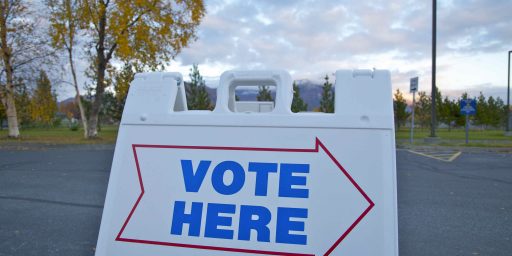HUMANITIES AND DEFENSE
Bruce Cole, chairman of the National Endowment of the Humanities, has a piece in today’s WSJ arguing that our society’s lack of humanties knowledge is dangerous:
Our values, ideas and collective memories are not self-sustaining. Just as free peoples must take responsibility for their own defense, they also must pass on to future generations the knowledge that sustains democracy.
It has been said that the erosion of freedom comes from three sources: from without, from within and from the passing of time. Though not as visible as marching armies, the injuries of time lead to the same outcome: a surrender of American ideals. Abraham Lincoln warned of this “silent artillery”–the fading memory of what we believe as Americans and why. And this loss of American memory has profound implications on our national security.
All great principles and institutions face challenges, and the wisdom of the humanities, and the pillars of democratic self-government, are not immune. We face a serious challenge to our country that lies within our borders–and even within our schools: the threat of American amnesia.
***
One study of university students found that 40% could not place the Civil War in the correct half-century. Only 37% knew that the Battle of the Bulge took place during World War II. A national test of high school seniors found that 57% performed “below basic” level in American history. What does that mean? Well, over half of those tested couldn’t say whom we fought in World War II. Eighteen percent believed that the Germans were our allies!
Such collective amnesia is dangerous. Citizens kept ignorant of their history are robbed of the riches of their heritage, and handicapped in their ability to understand and appreciate other cultures.
If Americans cannot recall whom we fought, and whom we fought alongside, during World War II, it should not be assumed that they will long remember what happened on September 11 or why we must be prepared and vigilant today. And a nation that does not know why it exists, or what it stands for, cannot be expected to long endure. As columnist George Will wrote, “We cannot defend what we cannot define.”
While that sounds good, I wonder whether it’s actually true.
While I enjoy reading history and think there is much value to “knowledge for knowledge’s sake,” what practical value does it have? We’re unlikely to fight WWII again. And even those who vividly remember Vietnam seem to draw rather contradictory lessons from it. So, so what?
The United States seems to have rather little difficulty mustering the will to fight in defense of its interests. Indeed, there have been few years since 1941 when we didn’t have forces on the ground shooting at someone, somewhere. Most Americans probably didn’t know or only vaguely recalled that we were peripherally involved in Afghanistan during the Carter Administration and beyond; that didn’t seem to limit our ability to wage war there after 9/11.





